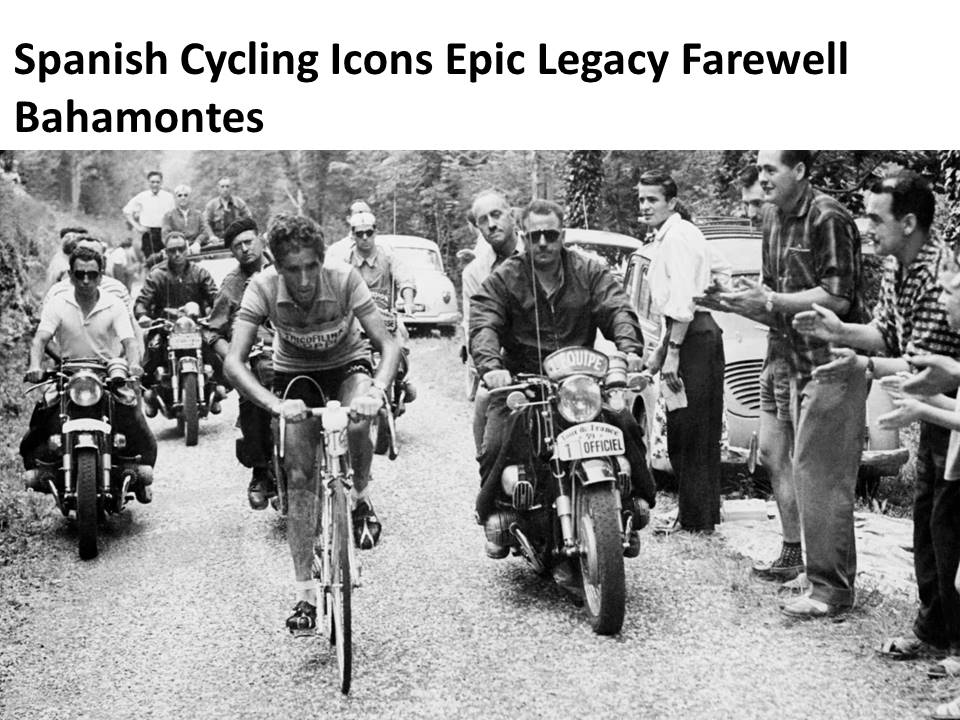Federico Bahamontes, Renowned Spanish Winner of Tour de France and Cycling Legend, Passes Away at 95 Spanish Cycling Icon’s Epic Legacy Farewell Bahamontes The champion of the Grand Boucle in 1959 was the oldest living winner until his recent demise. A stalwart of the Tour has bid farewell. Federico Bahamontes passed away on Tuesday, August 8, at the age of 95, as announced by the mayor of Toledo, his hometown. This announcement was confirmed by the Spanish Ministry of Sports. The former cyclist, who became the first Spanish rider to conquer the Tour de France in 1959, will forever be remembered as one of the greatest climbers the race has ever witnessed. He had been the eldest living winner of the Grand Boucle until this time. Bahamontes also clinched the Tour’s King of the Mountains title six times (1954, 1958, 1959, 1962, 1963, and 1964), a record only later surpassed by Richard Virenque.
A trailblazer in Spanish cycling across the Pyrenees, Federico Bahamontes was also one of the pioneering specialists of mountain ascents, a skill he dominated throughout his career, earning him the moniker “Eagle of Toledo.” With his lean, almost slender frame, the Spaniard possessed a unique and aerial style whenever gradients steepened. It was this innate talent in the mountains that propelled him to victory during the 1959 Tour de France, the pinnacle of his career, achieved through a triumph in a time trial on the slopes of Puy-de-Dôme.
“While Virenque is a climber, I am Napoleon!” Always on the attack when the road inclined upwards, Federico Bahamontes embodied panache and spirit. In 2013, he was voted as the greatest climber in Tour de France history by a panel for the race’s centenary, and he took the opportunity to voice his opinion on his successors in an interview with L’Equipe Magazine, saying, “My ranking: first, Bahamontes. Second, Charly Gaul. Then there are three or four who can be debated. Virenque doesn’t even come close to me. If he’s a climber, I am Napoleon!”
With 74 professional victories, including eleven stage wins in Grand Tours (seven in the Tour de France), he stands as one of the few riders to secure the King of the Mountains classification in the Tours of France, Spain, and Italy. His record could have been even more extensive – he finished second in the 1963 Tour de France, 3rd in 1964, and 2nd in the 1957 Vuelta a España – if he had possessed more descending prowess, which often compelled him to go on the offensive whenever the road pointed skyward.
He was inducted into the pantheon of cycling history by the International Cycling Union in 2002. His career was also marked by strokes of luck and fortunate coincidences. Having taken up cycling later in life after working in a bike repair shop, he participated in his first Tour de France in 1954, shortly after turning professional. His role as the leader of the Spanish team in the 1959 Tour was the result of a conflict with his major rival, Jesus Loroño, who refused to be his right-hand man.
An idol in Spain, two days of official mourning “as a symbol of grief and recognition” were declared by the mayor of Toledo, a city where a statue of Federico Bahamontes stands. “An adopted son of Toledo, admired and beloved, Fede moved us with his extraordinary ascents,” remarked Carlos Velazquez. “Thanks to him, we all won the Tour.” Alberto Contador, one of the other six Spanish Tour winners following Bahamontes, also shared his thoughts, saying, “He showed us the way.”
